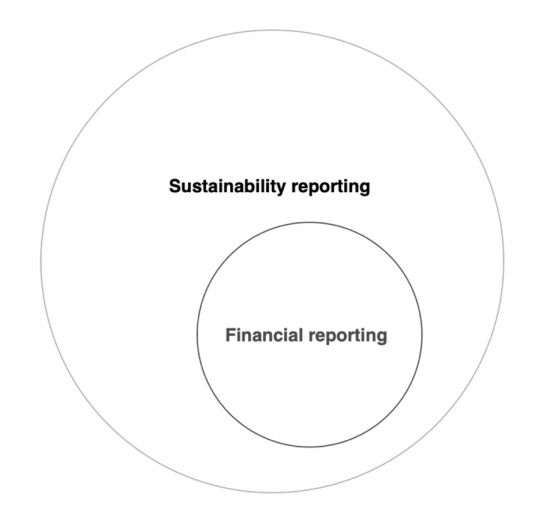Some readers of this blog will recall that last December I invited those with concern about environmental change to comment to the International Financial Reporting Standards Foundation, which sets the rules on international accounting, on its proposed creation of a Sustainability Standards Board. As I said then:
Simply put [this proposal suggests] that the sustainability reports are quite separate from any company's accounts at present. It's as if business still thinks that making money and being green are separate issues, and that this environmental stuff is all very nice but the hardcore activity of making money should be unsullied by it. This is their world view:
There is, of course, a problem with that attitude. Unless business goes green then there is no chance of net-zero carbon targets being met. But business won't go green until it is a bottom line, profit and loss issue. And it will not become a bottom-line issue until climate change is forced onto a businesses' balance sheet and into its profit and loss account. This is what we need:
On April 30 the IFRS Foundation published its response. It is profoundly disappointing.
Sixteen per cent of all submissions to the IFRS referred to sustainable cost accounting, or to putting the liability for climate change in the accounts. There is no mention of this in the IFRS response that I can see. They are instead going ahead as planned.
They can do this, of course. But what we are now seeing, almost daily, from the investment community is calls for better sustainability data.
The IFRS proposals will not meet that need. They are off balance sheet. They do not impact appraisal as to whether a company is a going concern or not. They do not require full audit. They are at risk of perpetuating greenwash at a time when those whose interests the IFRS Foundation says it services in the investment community says it wants so much more.
It really is time we had proper accounting for climate change and so far only sustainable cost accounting is seeking to deliver that.
Thanks for reading this post.
You can share this post on social media of your choice by clicking these icons:
You can subscribe to this blog's daily email here.
And if you would like to support this blog you can, here:




The only conclusion from this obduracy by the IFRS is that they must be worried that their funding may be cut and that they are reliant on fossil fuel companies and others completely engulfed in preserving the status quo and totally unaware or in denial of the climate heating crisis and ecological breakdown.